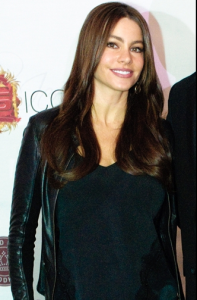the emmys: disappointingly outdated and unwilling to change
Among the countless Twitter users live-tweeting Monday night’s Primetime Emmy awards was Janet Mock, an author and transgender activist from New York City. Her tweets were unrelentingly funny, astute and honest about the awards, as well as the industry being awarded. None were as biting, however, as one of her most popular tweets of the night.
‘Why doesn’t Hollywood write compelling characters for women? Because they’re too busy putting them on spinning pedestals,’ she wrote.
The moment she was referring to was Modern Family star Sofia Vergara stepping up onto a rotating podium while Bruce Rosenblum, President of the Academy of Television Arts and Sciences, presented a rote spiel that is recited every year, and literally treating Vergara as an object.
The reasoning behind the bit was that having Vergara on screen would ensure Rosenblum had the audience’s attention during his statement. It was presented in a way that was supposed to feel smart and “ironic,” like some sort of self-aware throwback to classic Hollywood. Instead, it felt demeaning, sexist, slightly racist (there were a few easy jokes made about Vergara’s Colombian heritage), and made the audience collectively uncomfortable.
This is especially disappointing since, up to this point, the 2014 Emmys had seemed almost progressive compared to previous years. Not only was a show about a women’s prison that arguably has the largest and most diverse female cast on television the year’s most nominated comedy series; one of those nominations belonged to Laverne Cox, the first openly transgendered actress to ever be nominated for an Emmy.
While still far from being a comprehensive or even very inclusive landscape for female actors, television is beginning to show signs of changing. Two female-led shows, Orange is the New Black and The Good Wife, easily matched, and even surpassed, programs like True Detective and Breaking Bad in term of audience interest and critical acclaim. Shows like Broad City, Parks and Recreation, and Veep continue to prove that comedies can have a female lead and be successful.
The Emmys, however, still feel disappointingly outdated, and unwilling to change. Of the six nominees in the Lead Drama Actress category, Masters of Sex star Lizzy Caplan is the only actress not to have been previously nominated. Similarly, True Detective is the only show in the Drama Series category that was not up for this award last year. In that respect, the Emmys treatment of Vergara does not come as that much of a surprise, keeping with their tendency to never stray too far from tradition. A highly progressive show like OITNB can earn an impressive amount of nominations, but the actresses will hardly be asked anything on the red carpet that isn’t about their clothing.
One of the main reasons behind the Emmys being telecast on a Monday night this year, moving from its usual Sunday, was to avoid competition with MTV’s Video Music Awards, which was held the night before and featured a sixteen minute performance by Beyoncé. In the middle of the performance, she stands in front of a massive screen emblazoned with the word “feminist.” The VMAs may not have the same prestige as the Emmys, or even share much of the same audience, but their modern and forward-thinking mindset is infinitely more interesting than the archaic ideals the Television Academy places its own past nominees against.
This year’s Seth Meyers-hosted ceremony was actually quite pleasant compared to previous years. The night moved at a generally quick pace, with gags landing regularly and Meyers proving to be a charming, if sometimes bland presence. Considering this, as well as the currently improving climate for women in television, it is even harder to believe that a bit so brazenly sexist and alienating could make it onto the air. Television is evolving, providing a refuge for sprawling stories and complex characters, while the award show committed to honouring the best TV has to offer, remains defiantly in the past.


